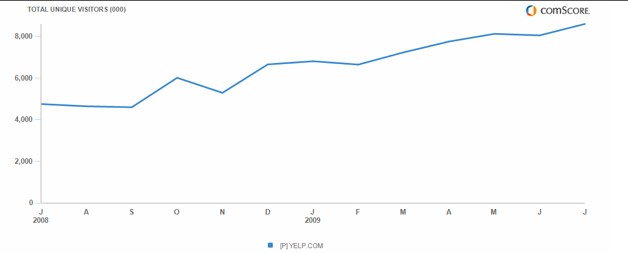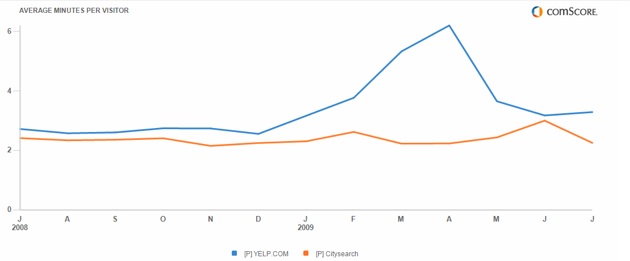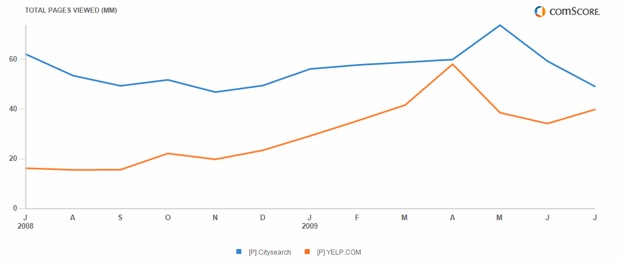
Say what you will about the quality of the reviews on Yelp or the lengths it will go to get verboten features into its iPhone app, it has made the jump from Web 2.0 darling to a mainstream service. Over the past year, Yelp has nearly doubled its U.S. audience, while incumbent CitySearch has remained flat. In July, Yelp had 8.6 million unique U.S. visitors, up 80 percent from a year ago. Citysearch, on the other hand, literally had zero growth, staying at 15.4 million uniques, although it bottomed at 13 million in April and has come back up since then (comScore).
Yelp also has the No. 1 travel app on the iPhone (it is No. 26 overall). Whereas Citysearch’s similar iPhone app is not even in the top 20 travel apps.
Yelp’s pageviews and average time spent per user on the site are also up 150 percent and 22 percent, respectively. In fact, the 3.3 average minutes per visitor on Yelp is above Citysearch’s 2.3 minute average. But comScore shows a steep drop in both pageviews and average time spent starting in May, with a leveling off in July. Citysearch experienced similar drops. (See charts below). It’s hard to say what is causing these drops. It could be that people are not finding what they are looking for, or the opposite, that they are finding what they need faster due to better site design. I suspect it has something to do with the latter. For instance, a much-improved Citysearch redesign went site-wide in March and Yelp is constantly tweaking its site. Update: Kara Nortman, the executive who runs Citysearch, says that the pageview numbers are down slightly, but not as much as comScore suggests. Part of this has to do with Citysearch actually going through the site and “pulling out pages that are not great consumer experiences,” which hurts SEO, but improves the site overall. Citysearch is also trying to reduce the number of searches it takes ti get to what you want, which also causes pageviews to drop.
I asked Yelp CEO Jeremy Stoppelman about the pageview situation, and he sent me an internal Google Analytics chart pasted at bottom of this post). “As you can see we’ve continued to grow pageviews smoothly throughout the summer,” he says, “so it looks like the effect Comscore is reporting is spurious.” There is definitely a discrepancy there. Stoppleman also says that worldwide Yelp did 157 million pageviews in August (although he thinks that is becoming a less a meaningful metric as Ajax redesigns reduce the need for page refreshes) and more than 25 million unique visitors. (The comScore numbers cited above are only for the U.S.)
Yelp came out with a major update for its iPhone app in April, right about the time the pageviews started to allegedly decline. But Stoppelman doesn’t think that is it either. There might be some shift over to mobile, but he’s seeing the following trends:
Mobile usage for us is lowest early in the week and climbs throughout, peaking on Saturday. Desktop web usage (especially contributions) tends to be highest on Monday or Tuesday (though Yelp.com reader traffic sometimes peaks on Fridays as people plan their weekend in the office ;).
No matter which way you cut the numbers, though, Yelp is gaining fast on Citysearch. Update “I worry about everyone,” says Citysearch’s Nortman. “I think you’ll start to see some pretty strategic initiatives roll out across the web and mobile. We have this new neighborhood platform in place. We have to fill it up with trusted content.” That is how Citysearch will try to stand apart, by having reviews and other content that is more trustworthy than Yelp’s. Which site do you trust more?
Average Minutes Per Visitor

Total Pageviews

Yelp’s Daily Pageviews (Google Analytics)
